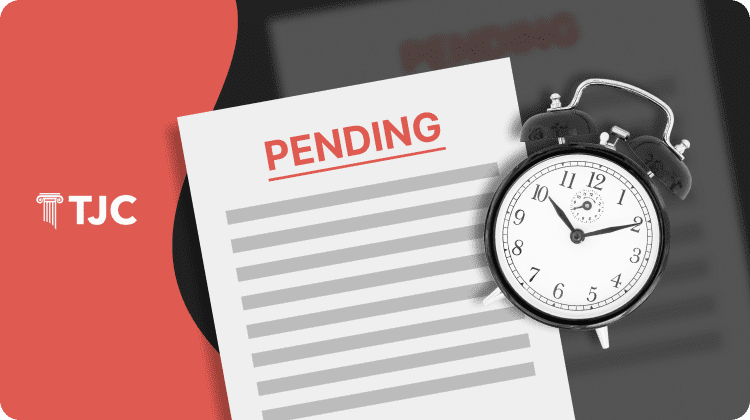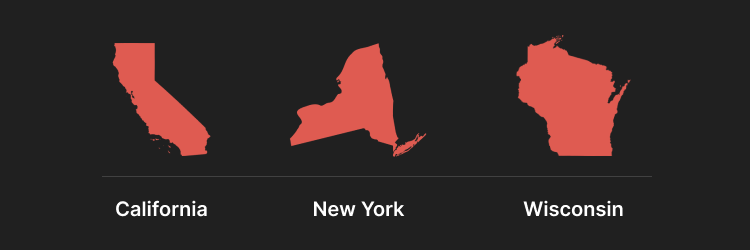Many people ask if pending charges appear on background checks, especially during job applications or other evaluations. Knowing how background checks function and what they reveal can ease concerns and clarify expectations.
Need a Background Check?
Get StartedWhat Are Pending Charges?
Pending charges occur when someone is arrested for an alleged crime but the case isn’t resolved yet. The prosecutor is still reviewing the case to decide whether to file formal charges and proceed with prosecution. It’s a period of uncertainty because the outcome can have a big impact on the court system and the person’s future.
Pending charges can range from minor offenses to serious allegations. Legal proceedings are ongoing during this time, and the outcome of the court process could involve dropping the charges, negotiating a plea deal, or going to trial.
Forms of Pending Charges
Pending charges can take different forms based on the stage of the legal process. Here are the main types:
No Formal Charges Have Been Filed:
Sometimes, a person can be arrested, but the prosecutor hasn’t yet decided to press charges. This can happen for a few reasons, like needing more investigation or waiting for more evidence. The case is unresolved during this time, and the person might feel stress and uncertainty about what will happen next.
Charges Filed But Outcome Awaiting Determination:
Another pending charge happens when formal charges have been filed, but the case isn’t finished yet. This pending criminal charge means the legal process is still ongoing, with court dates, plea talks, or trials still to come. The outcome is still undecided, and the person remains in legal uncertainty.
Do Background Checks Show Pending Charges
Most background checks show pending charges, which is important for employers and others to understand someone’s legal history. However, the details can vary based on several factors.
Whether pending charges appear on a background check depends on state laws, the type of search, and the severity of the charges. Different states have different rules about disclosing pending charges; some background checks are more detailed than others. Serious charges are more likely to show up compared to minor ones.
For example, some states have strict rules about what other criminal defense can be reported, and in some places, pending charges might not be shown at all. In contrast, federal background checks usually provide a thorough view, including pending charges.
Why Do Pending Charges Show up in a Background Check?
Pending charges appear in background checks because they provide a fuller picture of someone’s legal history. Knowing about pending charges helps employers and others make better-informed decisions, as the outcome of these charges can impact future behavior or reliability.
Background checks present an accurate and comprehensive view of a person’s criminal history. Including pending charges ensures transparency and helps organizations maintain safety and integrity.
Factors That Determine if Pending Charges Will Be Included in a Background Check
Several factors influence whether pending charges will appear in a criminal background check.
- State Laws: Different states have different laws about what can be shown in criminal background checks. Some states may limit reporting certain pending charges, while others might include all pending charges.
- Type of Background Check: The thoroughness of the background check matters. For example, a federal background check is usually more detailed and likely to include pending charges compared to a state or local check.
- The seriousness of Charges: The type and seriousness of pending charges can affect if they show up in background checks. Serious charges are more likely to appear in employment background checks than minor ones.
- Reporting Timeframes: The time it takes for pending charges to show up in background check databases varies. Some systems update almost right away, while others can take weeks or even months to show new information.
How Long Does It Take for a Pending Charge to Show Up on a Background Check?
The time it takes for a pending criminal charge to show up on a background check can vary. Sometimes, it appears shortly after it’s filed, but other times it might take weeks or even months, especially for state-level checks. This delay happens because it takes time to process and enter data into the databases used for background checks. So, while some charges might show up fast, others take longer to appear.
Employment Background Check Laws on Pending Charges
When it comes to employment background checks, the rules about including pending charges can get pretty complicated. Both federal and state laws influence what can be shown on these checks, and it’s essential to understand how these laws work to know what to expect.
Federal Laws
Federal laws set the groundwork for what background checks can include and how this information can be used. Here are the key federal laws to be aware of:
Fair Credit Reporting Act (FCRA)
The Fair Credit Reporting Act (FCRA) is an important law governing how background checks are conducted. Under the FCRA, employers must obtain written consent from job applicants before conducting a background check. They also need to provide applicants with a copy of the report if any adverse action, like not hiring the person, is taken based on the background check results. This ensures transparency and fairness in the hiring and employment background screening process itself.
Title VII of the Civil Rights Act of 1964
Title VII of the Civil Rights Act of 1964 plays a significant role in preventing discrimination in employment practices, including the use of background checks and employment discrimination. Employers must ensure that their use of criminal records, including pending charges, does not disproportionately impact applicants from protected classes unless there is a justifiable business necessity. This helps prevent discriminatory practices and promotes equal employment opportunities.
State Laws
State laws can vary widely when it comes to what can be included in a background check, especially regarding pending charges. Some states are more restrictive and may not allow pending charges to be reported, while others might include all pending charges in the report.
Understanding these differences is very important for both employers and job applicants. For example, some states may only allow the reporting of convictions, not arrests or pending charges, while others might include all criminal history information.
Because of these variations, it’s often necessary to consult with legal counsel to understand the specific regulations in your state. This ensures compliance with local laws and helps avoid potential legal issues.
What to Do if Your Applicant Has a Pending Charge
When you find out that a job candidate has a pending charge, it’s essential to handle it with care and fairness. Start by checking if the information is correct. Then, think about how relevant the pending criminal charge is to the job they’re applying for. Consider what the offense was, how long ago it happened, and what the job involves. Following the Equal Employment Opportunity Commission (EEOC) guidelines on fair and unbiased evaluation can help ensure you make a legal and fair decision when hiring.
Verify the Information
Here are the steps to follow to verify if the information is accurate:
- Double Check the Source: Confirm that the information comes from a reliable background check provider.
- Contact Legal Authorities: If necessary, reach out to local law enforcement or court systems to verify the pending charge.
- Communicate with the Applicant: Discuss the findings with the applicant to get their side of the story and any additional context.
Evaluate the Pending Charge in Relation to the Position
When assessing the relevance of a pending charge to the job, consider the following:
- Nature of the Offense: Determine if the charge is related to behaviors or activities that would directly impact job performance or workplace safety.
- Time Elapsed: Consider how much time has passed since the charge was filed. A more recent charge may be more relevant.
- Job Duties: Assess if the nature of the job duties could be affected by the pending charge. For example, a financial crime might be more concerning for a position handling money.
According to the Equal Employment Opportunity Commission (EEOC) guidance, employers should avoid discriminatory practices and workplace discrimination by evaluating each case individually and considering these factors in a non-discriminatory manner.
What States Prohibit Pending Charges on a Background Check
Several states have specific restrictions on including pending charges in background checks. Here are a few:
- California: Generally prohibits the use of arrest records that did not result in a conviction.
- New York: Has similar restrictions, focusing on the outcome rather than the charge itself.
- Wisconsin: Also restricts the use of pending charges in background checks, requiring more substantial proof of the charges.
Run a Background Check on Yourself
Ensure the accuracy of your personal records
Background Check FAQs
How Far Back Do Background Checks Go?
Background checks typically go back seven years, which is the standard timeframe for most criminal checks, according to the Fair Credit Reporting Act (FCRA). However, this can vary depending on state laws and the type of check being conducted. Some states allow employers to look back further, especially for positions of high responsibility.
How Far Back Do Federal Background Checks Go?
Federal background checks often go back seven to ten years. These checks are usually more thorough and can include information about federal crimes, security clearances, and more. The exact timeframe can depend on the nature of the job and the specific regulations in place for federal employment.
How Far Back Do Fingerprint Background Checks Go?
Fingerprint background checks can go back as far as a person’s lifetime. They connect to the FBI database and show any criminal history linked to those fingerprints, no matter how long ago the crimes happened. This is helpful for jobs where security and trust are super important.
Do Pending Charges Show up on Background Checks in Georgia?
Yes, pending charges typically show up on background checks in Georgia. The state allows for the inclusion of pending criminal charges in background reports to provide a comprehensive view of an individual’s criminal history. This helps employers make more informed decisions.
What State Doesn’t Do Background Checks?
No state completely prohibits background checks, but some states have stricter regulations on what can be reported. For example, states like California and New York have limitations on reporting non-conviction records, including certain pending charges.
Will Pending Charges Show Up on a Background Check in Texas?
Yes, pending charges will show up on a background check in Texas. Texas law allows the inclusion of pending charges in criminal background reports, which helps employers assess any potential risks associated with hiring decisions.
What Is a Red Flag on a Background Check?
A red flag on a background check can be any information that raises concerns about an applicant’s suitability for a position. This could include a history of violent crimes, repeated offenses, financial instability (for financial positions), or discrepancies in employment history. Employers use this information to evaluate potential risks.
Can an Employer Fire You for Pending Charges in California?
Yes, an employer in California can potentially fire you for pending charges if those charges are relevant to your job or if they violate company policy. However, California has strict laws about using criminal records in employment decisions, so employers must ensure they are compliant with regulations like the Fair Employment and Housing Act (FEHA).
What Is a Pending Background Check?
A pending background check means the process is still ongoing. This could be due to delays in retrieving information from various sources, or the need for further investigation into certain aspects of the applicant’s criminal history itself. It’s a temporary status indicating that the final results are not yet available.
What Background Check Do Most Employers Use?
Most employers use a combination of criminal history, employment verification, education verification, pre-employment background checks, and sometimes credit checks. The specific checks used can vary based on the industry and the level of responsibility associated with the position. Criminal background checks are among the most common.
Do Pending Charges Show Up on a Background Check in NY?
Yes, pending charges do show up on background checks in New York. While New York restricts the reporting of some types of arrest records, pending charges are still included in background screening, providing employers with current and relevant information about an applicant’s legal status.
Conclusion
In summary, pending charges can typically show up on a background check. However, several factors affect this. Understanding the nature of pending charges and how various types of background checks function is key. Both federal law and state laws determine what information can be revealed.
For individuals undergoing background checks, being aware of these details can help set expectations and reduce worries. It’s essential to ensure the accuracy of information and assess the relevance of pending cases and charges for fair decision-making. Consulting legal professionals can clarify specific state regulations and ensure compliance.




